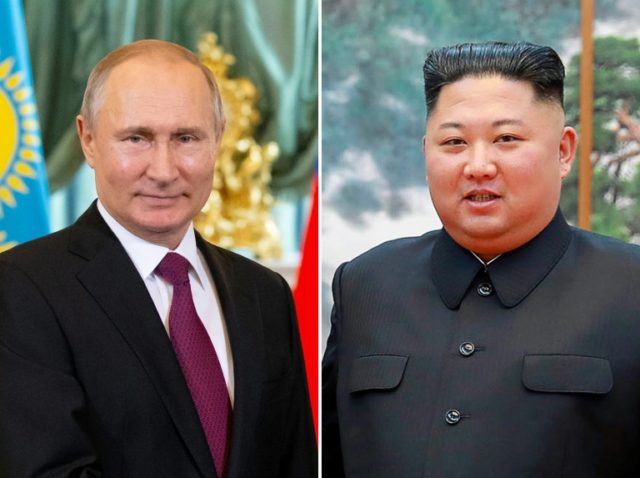The Russian government confirmed Thursday an unprecedented in-person meeting between President Vladimir Putin and North Korean dictator Kim Jong-un before the end of the month, noting that it anticipates positive “chemistry” between the leaders but it can only help so much.
“Personal ‘chemistry’ can facilitate a full understanding, but it can’t guarantee that,” Kremlin spokesman Dmitry Peskov told reporters Friday. “Speaking of chemistry, we’ll see. President Putin will meet Kim, let’s wait for the results of their talks.”
Peskov said the “main thing is to respect each other’s interests and trust one another,” an apparent jab at U.S. policy towards North Korea. Following a meeting between Kim and American President Donald Trump that ended with the latter walking out, Pyongyang announced it would not seek any additional such meetings and demanded that Trump fire Secretary of State Mike Pompeo and replace him with someone more “mature.”
The Kremlin announced the meeting between the two leaders after months of speculation it would occur, culminating most recently with a report by South Korea’s Yonhap newswire service suggesting, citing anonymous sources, that Putin would stop in North Korea on the way to the summit China is hosting this month to promote its Belt and Road Initiative (BRI). Belt and Road is a global infrastructure plan that, if successful, would grant Beijing control over nearly all of the world’s most important transportation hubs. Its allure lies in attracting weak economies – like Russia’s and North Korea’s – into participating in exchange for building ports and railways those countries otherwise could not afford.
Putin’s visit will occur shortly after a visit by senior Russian lawmakers to Pyongyang last week to discuss further economic cooperation. The Russians hinted at being open to selling civil airplanes to the North Korean government, perhaps to expand its fleet for tourism purposes. North Korean officials made tourism a priority during talks with both American and Chinese officials last year.
Putin publicly invited Kim to visit Moscow last year. Kim did not reject the offer, but did begin planning for a second summit with Trump, instead. That summit occurred in February in Vietnam. It ended, unlike their first meeting in Singapore last year, with no joint statement or agreement. Instead, Trump complained to reporters that North Korean negotiators were insisting on the U.S. lifting economic sanctions on their government before Pyongyang showed proof that it had definitively ended its illegal nuclear weapons program. Trump has repeatedly stated he would not support lifting international sanctions, or lift American ones, without complete, verifiable, and irreversible denuclearization.
North Korean officials later claimed Trump was lying about their position. Kim followed up with a speech this week insisting, “the United States will not be able to move us one iota nor get what it wants at all, even if it sits with us a hundred times, a thousand times.”
Speaking before the senior leaders of the Workers’ Party of Korea (WPK), Kim said the Hanoi summit “raised strong questions about whether the steps we took under our strategic, courageous decision were right” and that he would not seek another “trivial” meeting like that for the indefinite future. He added as a caveat that he retained good personal relations with Trump, perhaps inspiring Peskov’s comment that “chemistry” is not enough between two leaders.
Russia has long been one of North Korea’s closest allies. Recently, Russian officials have become a consistent voice calling for the United Nations to lift its strict sanctions on many sectors of the North Korean economy.
“It is unacceptable for sanctions against the DPRK to become an instrument of collective punishment,” Russian Foreign Minister Sergei Lavrov said in September. “Against a backdrop of readiness of Pyongyang to cooperate … it seems inappropriate and untimely when our Western partners have imposed a course of tightening sanctions against Pyongyang.”
Russia also stands accused of helping North Korea evade sanctions through illegal shipments of coal and other goods. North Korea cannot export some of its most important resources, coal at the top of the list, and sanctions ban outsiders from gifting senior Pyongyang officials luxury goods from abroad. This has not stopped some, like Chinese Communist Party leader Xi Jinping, from doing so.

COMMENTS
Please let us know if you're having issues with commenting.